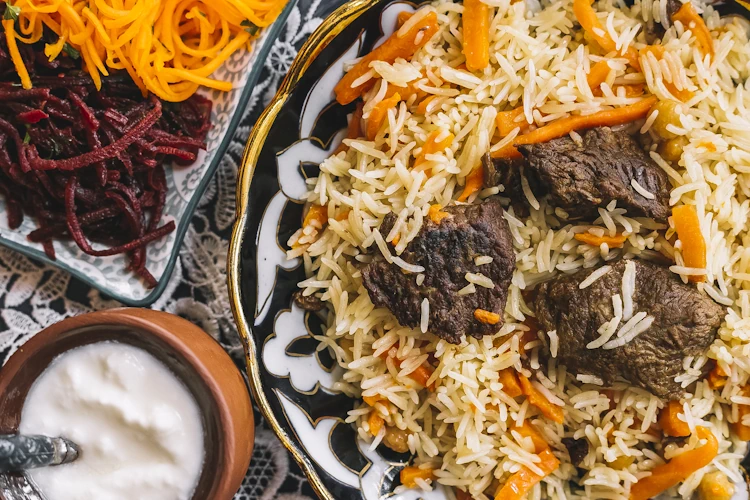Middle Eastern cuisine is a tantalizing fusion of flavors, colors, and aromas that has captivated taste buds across the globe. From succulent kebabs to aromatic rice dishes and exotic spices, the culinary journey through this region is a gastronomic delight. In this article, we will embark on a flavorful adventure through the heart of Middle Eastern cuisine, exploring its rich history, signature dishes, and the secret behind its timeless appeal.
Exploring the Culinary Tapestry of the Middle East
A Taste of History
Middle Eastern cuisine boasts a heritage that spans thousands of years. It has been influenced by a myriad of cultures, including Persian, Arabic, Ottoman, and Mediterranean. These influences have melded together to create a tapestry of flavors that is both diverse and harmonious.
The Spice Bazaar
Spices are the soul of Middle Eastern cooking. We will delve into the aromatic world of spices and herbs that give these dishes their distinctive taste. From cumin and coriander to sumac and saffron, these ingredients add depth and complexity to every dish.
Mezze: The Art of Small Plates
Mezze, the Middle Eastern version of appetizers, showcases a colorful array of small dishes. We will explore the art of mezze, featuring classics like hummus, tabbouleh, and baba ganoush. These small plates are perfect for sharing and set the stage for the main course.
Kebabs: The Grilled Delight
Kebabs are a cornerstone of Middle Eastern cuisine. We will uncover the secrets of perfectly marinated meats and vegetables, skewered to perfection and grilled over open flames. Each bite is a burst of smoky goodness.
The Magic of Rice and Saffron
Rice is a staple in Middle Eastern cooking, and saffron is the crown jewel of spices. We will explore dishes like biryani, pilaf, and maqluba, where rice is cooked to fluffy perfection and infused with saffron’s golden hues.

A Feast for the Senses
Aromatic Tagines
Tagines are slow-cooked stews that simmer with a tantalizing blend of spices. We will discover how these clay pots create tender and flavorful dishes like Moroccan lamb tagine and vegetable tagine.
Shawarma: The Street Food Sensation
Shawarma, with its layers of succulent meat, is a street food sensation that has taken the world by storm. We will unravel the mystery of the vertical rotisserie and the art of shaving off slices of perfectly cooked meat.
Baklava: A Sweet Symphony
No Middle Eastern meal is complete without a sweet ending. Baklava, with its layers of flaky pastry, nuts, and syrup, is a dessert fit for royalty. We will savor the sweetness and explore its variations.
Freshness in Every Bite: Falafel and Tzatziki
Falafel, made from ground chickpeas or fava beans, is a crispy delight. We will also delve into tzatziki, the cool and creamy yogurt sauce that perfectly complements falafel.
The Hospitality of Middle Eastern Dining
The Art of Tea and Coffee
Tea and coffee hold a special place in Middle Eastern culture. We will learn about the intricate process of brewing strong and fragrant Turkish coffee and the delicate art of pouring mint tea.
Savoring Every Bite
Middle Eastern cuisine is not just about the food; it’s about the experience. We will discuss the tradition of communal dining and how it fosters a sense of togetherness and hospitality.
Conclusion
In conclusion, Middle Eastern cuisine is a culinary journey that engages all the senses. Its rich history, diverse flavors, and warm hospitality make it a cuisine worth savoring. So, whether you’re enjoying mezze with friends, sipping on aromatic tea, or indulging in baklava, Middle Eastern cuisine is an experience that leaves a lasting impression.
Frequently Asked Questions
1. What makes Middle Eastern cuisine unique?
Middle Eastern cuisine is unique due to its rich history, diverse flavors, and the use of aromatic spices and herbs that create a harmonious blend of taste and aroma.
2. What are some must-try dishes in Middle Eastern cuisine?
Some must-try dishes include kebabs, shawarma, hummus, baklava, and tagines. These dishes showcase the diverse and flavorful nature of Middle Eastern cooking.
3. Is Middle Eastern cuisine suitable for vegetarians?
Yes, Middle Eastern cuisine offers a wide range of vegetarian options, including falafel, mezze, and various rice dishes, making it a great choice for vegetarians.
4. How can I recreate Middle Eastern dishes at home?
To recreate Middle Eastern dishes at home, start by gathering authentic spices and ingredients. Follow traditional recipes, and don’t be afraid to experiment with flavors to suit your taste.
5. Where can I find Middle Eastern restaurants?
You can find Middle Eastern restaurants in many cities around the world. Check online directories or ask locals for recommendations to discover authentic Middle Eastern dining experiences.





